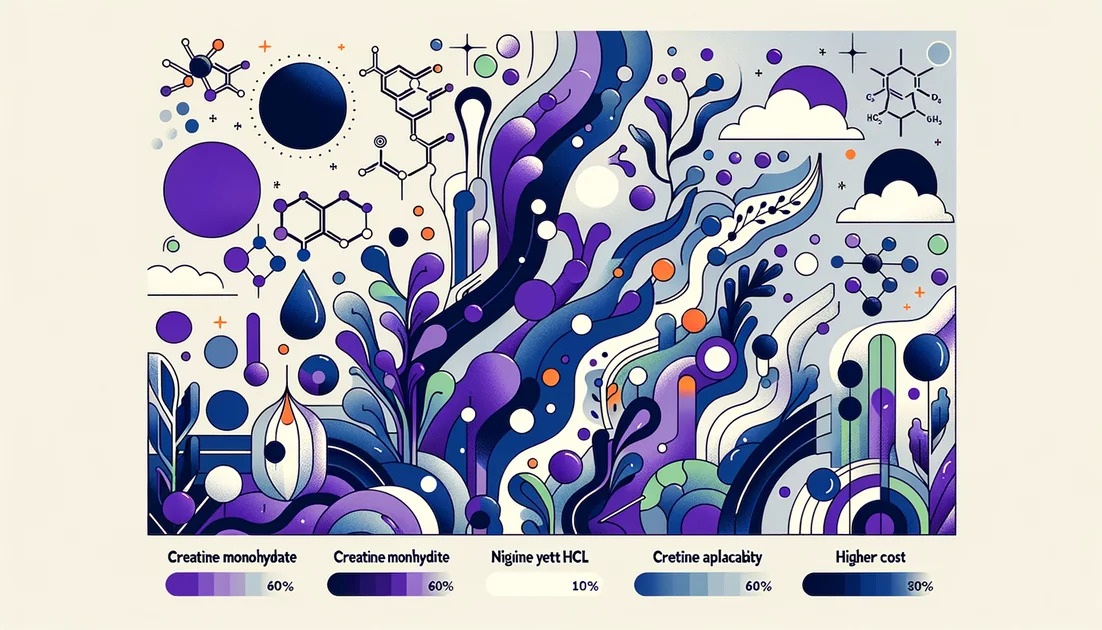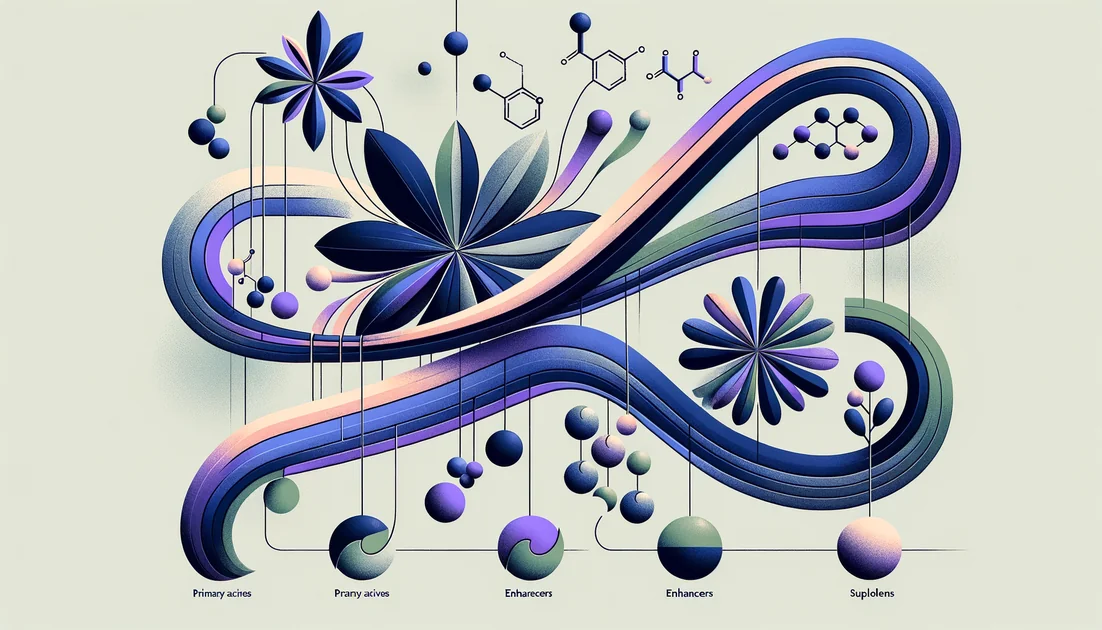
Alpha-GPC vs CDP-Choline (Citicoline)
For daily focus and memory, pick Citicoline (250–500 mg/day). For a one-off workout power boost, Alpha-GPC (≈600 mg pre-session) has limited acute data—but weigh a cohort signal of higher long-term stroke risk if used chronically, especially in older adults.
Citicoline wins for routine cognitive support and overall safety/regulatory backing in healthy adults, with multiple RCTs and favorable PK. Alpha-GPC may suit occasional pre-workout use or targeted short trials, but its long-term benefit–risk profile is less clear and an observational cohort suggests increased stroke risk in older users. Choose Citicoline for most daily needs; reserve Alpha-GPC for situational performance if you're low cardiovascular risk and monitored. [6][8][1][2][3][4]
The Comparison
AAlpha-GPC (choline alphoscerate)
by Common forms include AlphaSize, 99% or 50% titrations
Standardization: Typically 50% or 99% Alpha-GPC; ~40–41% choline by weight
Dosage: 300–600 mg once or twice daily; 600 mg 60–90 min pre-workout studied acutely
Benefits
- •High choline density; fast cholinergic support
- •Small RCTs suggest acute power/GH response around workouts
- •Signals of benefit in cognitive impairment in some trials/meta-analysis
Drawbacks
- •Observational signal of increased long-term stroke risk in older adults
- •Hygroscopic; purity/titration vary (50% vs 99%)
- •Evidence for healthy adults is limited vs citicoline
Safety:Generally well-tolerated short-term; GI upset, heartburn, insomnia/headache reported. Large Korean cohort linked chronic use with higher 10-yr stroke risk; discuss with a clinician, especially if at vascular risk.
BCDP-Choline (Citicoline)
by Common branded form: Cognizin
Standardization: ≥98% citicoline (EFSA spec for novel food); often sold as Cognizin 250–500 mg
Dosage: 250–500 mg/day for cognition; clinical/medical uses 500–1,000+ mg/day under supervision
Benefits
- •Human PK shows near-complete absorption; raises plasma choline and uridine (via cytidine)
- •Multiple RCTs show benefits to attention and episodic memory in healthy/older adults
- •Robust regulatory safety opinions up to 500–1,000 mg/day
Drawbacks
- •Some acute-stroke meta-analyses show no benefit on hard outcomes
- •Mild side effects (headache, insomnia, GI) possible
- •Lower choline density than Alpha-GPC (~18%)
Safety:EFSA considers citicoline safe at 500 mg/day in supplements and up to 1,000 mg/day in FSMPs; generally well-tolerated in RCTs. Caution with stimulating effects later in day; theoretical interactions with dopaminergic/cholinergic drugs—consult a clinician.
Head-to-Head Analysis
Efficacy for everyday focus/attention in healthy adults Critical
Winner:CDP-Choline (Citicoline)• Importance: high
Memory support in age-associated decline Critical
Winner:CDP-Choline (Citicoline)• Importance: high
Acute performance (power/explosiveness)
Winner:Alpha-GPC (choline alphoscerate)• Importance: medium
Single 600 mg Alpha-GPC dose 90 min pre-exercise increased bench-press peak force and GH vs placebo in a crossover trial; no comparable citicoline data. [1]
Onset/time-to-effect
Winner:Alpha-GPC (choline alphoscerate)• Importance: medium
Safety/tolerability (chronic use) Critical
Winner:CDP-Choline (Citicoline)• Importance: high
Bioavailability and mechanistic breadth
Winner:CDP-Choline (Citicoline)• Importance: medium
Standardization/quality consistency
Winner:CDP-Choline (Citicoline)• Importance: medium
Citicoline has ≥98% spec in EFSA novel food approval and widely used branded Cognizin; Alpha-GPC often sold at 50% or 99% titrations—label clarity varies. [7]
Common Questions
Which should I try first for day-to-day concentration?
Citicoline 250–500 mg/day has multiple RCTs in healthy cohorts and strong safety/regulatory backing. [10][11][7]
Is Alpha-GPC safe for long-term daily use?
Short-term use is usually well-tolerated, but a large cohort linked chronic α-GPC use to higher 10-yr stroke risk—discuss with your clinician if considering long-term use. [3][4]
Can I take them together?
Usually unnecessary; both supply choline. If stacking for experiments, start low, monitor for cholinergic side effects, and avoid late dosing. Consult a clinician if on cholinergic/dopaminergic meds. [7]
Which Should You Choose?
Daily focus/attention or mental clarity (students, knowledge work)
Choose:CDP-Choline (Citicoline)
Episodic memory support in healthy older adults (AAMI)
Choose:CDP-Choline (Citicoline)
12-week RCT showed improvements in episodic and composite memory at 500 mg/day. [9]
Pre-workout power or explosive effort (occasional use)
Choose:Alpha-GPC (choline alphoscerate)
600 mg ~90 min pre-lift increased peak force and GH acutely; consider as situational aid rather than chronic use. [1]
Cognitive impairment or vascular cognitive issues (with clinician)
Choose: Either option
Stacking with uridine/DHA or racetams
Choose:CDP-Choline (Citicoline)
You might also like
Explore more of our evidence-led investigations, comparisons, and guides across every article style.

The Vitamin Shoppe
The Testing Paradox at The Vitamin Shoppe: NSF-certified highs, transparency gaps, and value swings

Creatine Monohydrate (CM) vs Creatine Hydrochloride (Cr-HCl)
For most people, choose Creatine Monohydrate for proven results, simple dosing, and best value. Consider Creatine HCL only if you consistently get GI upset from CM and are willing to pay more; it hasn't shown better outcomes in trials. [1][2][4][5]


GABA (gamma-aminobutyric acid)
In 1950, a young biochemist named Eugene Roberts found an odd little molecule saturating the brain—GABA. At first, even giants of neuroscience doubted it was the language of inhibition. Decades later, you can buy it in gummies at the checkout line. Here's the paradox: the very messenger that tells brain cells to hush may not easily cross the brain's security gate. So why do some people feel calmer after swallowing it?[1][2][5]

Memory Stack With Real Clinical Data
Dual-core, theoretical synergy: both work on their own; together looks additive with plausible complementarity, but no direct human A+B head-to-head proof yet.

Tocotrienols
The stealthier cousins of vitamin E—built with springy tails that move differently in cell membranes and behave differently in your body.




